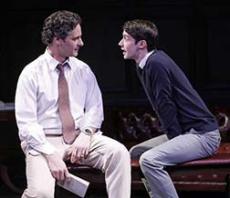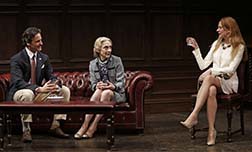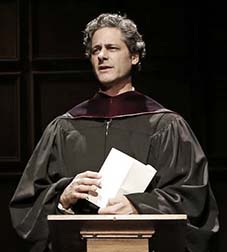
Lucy Komisar
| "The Old Boy" Engrossing but Predictable Gurney Play About a Preppy’s Moral Dilemma
"The Old Boy"
A.R.Gurney wrote this play in 1991, when the issue of AIDS was a hot button. The story takes off when Sam (Peter Rini), a State Department undersecretary of state for political affairs, returns to his prep-school to give a commencement address. Now in his early 40s, he had been the "old boy" of a younger student named Perry, charged with showing the new boy the rounds. The play like the décor is a bit dated. A red leather couch represents a preppy school lounge. But it is nevertheless engrossing, and it’s a treat to see Laura Esterman’s performance as Harriet, Perry’s upper class mother, who pushed him to play tennis when he really loved opera and played Viola in the all-boys school’s "Twelfth Night." (You already know where this is going.) Perry won a local tennis championship, but Sam criticized his game, saying he refused to go to the net, a metaphor for that he wasn’t tough enough.
Harriet, who we see as a charming manipulator in a Chanel-style suit, has arrived to present a gift to the school to build a tennis center in Perry’s name. The son’s widow Alison (Marsha Dietlein Bennett), has also come for the occasion. Sam learns that Perry died of AIDs. Alison who years ago had an affair with Sam, had been set up with Perry by Sam who wanted to keep the young man "straight." But Perry left her, came out as gay, and Harriet is now paying Alison off to keep her quiet. Cool, lower economic class and sharp, Alison remarks, "They say if you marry money, you earn every cent of it."
Though the story unfolds with Gurney’s play-writing skill, it is by now rather predictable, since there are many signposts to the dénouement. And it’s not helped by a cast that doesn’t always appear credible. Though Rini is also a manipulator (he and Harriet have that in common) and a womanizer, which fits quite well with Washington culture, he lacks the self-involved gravitas of a high-level State Department official; he’s too jokey, never departing from his preppy demeanor. Bud (Cary Donaldson), Sam’s aide, who would sign up to his campaign for governor if it got off the ground, is a nonentity. He doesn’t have the shark’s teeth such government and political operatives display. However, Chris Dwan gives Perry the requisite sensitivity and sense of tragedy. Tom Riis Farrell is good as Dexter, the Episcopal priest functionary who was a finalist to be rector but didn’t get the post, because he wasn’t married. Sam in his commencement speech rises to the occasion of acknowledging Perry’s reality, but he also shows his embedded attitudes with lines like, "There are Jewish guys here now and they raise the level of discourse, and we have black guys on scholarship who are a credit to their race." This is good as a reflection of the time. From the author of "The Cocktail Hour," "The Dining Room" and "Mrs. Farnsworth," it is not one of Gurney’s best plays.
Visit Lucy Komisar’s website http://thekomisarscoop.com |
| museums | NYTW mail | recordings | coupons | publications | classified |



